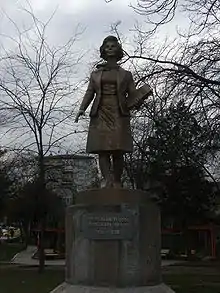Bahriye Üçok
Bahriye Üçok (1919 – October 6, 1990) was a Turkish academic of theology, left-wing politician, writer, columnist, and women's rights activist whose assassination in 1990 remains unresolved.

Early life and education
Born in Trabzon, Bahriye Üçok finished her primary education in Ordu and then graduated from Kandilli High School for Girls in Istanbul. She was educated in Medieval Islamic and Turkish History at the Faculty of Philology, History and Geography of Ankara University. At the same time, she attended the State Conservatory and completed the Opera section.[1]
Professional career
After eleven years working as a high school teacher[2] in Samsun and Ankara, she entered 1953 Ankara University as an assistant in the Faculty of Theology. She obtained her PhD in 1957, delivering and became 1965 an associate professor with her thesis on "Female rulers in Islamic countries" and finally professor, being the ever first female university teacher in this faculty. Being fluent in Arabic and Persian,[1] she interpreted Islam in a modern and tolerant way focusing on the role of women in Islam.[2]
Political career
In 1971, she was elected contingency senator by president Cevdet Sunay, and so her political career started.[2] Bahriye Üçok joined in 1977 the center-left Republican People's Party (Turkish: Cumhuriyet Halk Partisi, CHP). After the military coup in 1980, she co-founded the People's Party (Turkish: Halkçı Parti) and was elected deputy of Ordu into the Grand National Assembly of Turkey in 1984.[2] In 1985, after a fusion, (with SODEP) her party was renamed as Social Democratic People's Party (SHP).
Death
She also wrote her opinions in her column in the newspaper Cumhuriyet. After a TV forum, at which she declared that covered dressing in Islam (Hijab) is not obligatory, Bahriye Üçok received increasingly threats from the militant organization "Islamic Movement" (Turkish: İslami Hareket). Not a long time later, on October 6, 1990,[3] she was killed by a mail bomb as she was trying to open a book package in front of her house door.[4] The assassination remained unsolved. She was laid to rest at the Karşıyaka Cemetery in Ankara.[5]
Aftermath
Gülay Calap, known as the "parcel-girl" who had accepted the packet for delivery, disappeared for a long period after the assassination. On January 16, 1994 she was arrested in İzmir as the İzmir responsible of the Revolutionary People's Party, an organization that is aligned with the PKK. The court sentenced her to prison for 22 years and 6 months, where she stayed for 12 years. Calap joined the Democratic Society Party (DTP) in 2007 and became its vice president in November 2007.[6]
Selected works
- İslâm'dan Dönenler ve İlk Yalancı Peygamber (Renegers in Islam and the First Fake Prophet) (1967) Ankara
- İslâm Devletinde Kadın Hükümdarlar (Female Rulers in Islamic Countries)
- İslam Tarihi (History of Islam)
- Islam Tarihinde Emeviler - Abbasiler (Umayyads - Abbasids in the History of Islam)
- Atatürk'ün İzinde Bir Arpa Boyu (A Tiny Step in the Footsteps of Atatürk) 270p, (1985), Cem Publishing, Istanbul ISBN 978-975-406-467-4[7]
- Aly Mazahéri, Ortaçağda Müslümanların Günlük Yaşayışları (translation) (Daily Life of Muslims in the Middle Age)
References
- "Bahriye Üçok kimdir?". Yeni Çağ Gazetesi (in Turkish). 2020-10-06. Retrieved 2020-12-02.
- "Who's who in Politics in Turkey" (PDF). Heinrich Böll Stiftung. pp. 49–50. Archived from the original (PDF) on 15 November 2019. Retrieved 23 July 2020.
- "Turkish intelligence, PKK involved in professor's death: Claim - Turkey News". Hürriyet Daily News. Retrieved 2019-10-20.
- "Turkish intelligence, PKK involved in professor's death: Claim - Turkey News". Hürriyet Daily News. Retrieved 2020-11-20.
- "Bahriye Üçok anılıyor". Cumhuriyet (in Turkish). 2013-10-06. Archived from the original on 2013-10-23. Retrieved 2013-10-22.
- Hürriyet newspaper
- Atatürk'ün İzinde Bir Arpa Boyu, Yeni Sayfa (in Turkish)
External links
- Prof. Dr. Bahriye ÜÇOK, Atatürkçü Düşünce Derneği (in Turkish)
- Who is who (in Turkish)